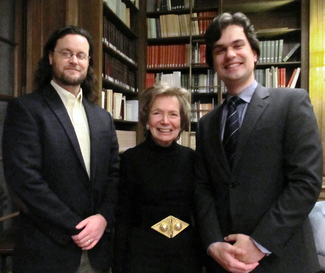Community News
This article first appeared in ISAW Newsletter 14, Winter 2016.
Marc LeBlanc
Assistant Director for Academic Affairs
 Randolph Ford with Founder Shelby White and Erik Hermans. Photo Courtesy of Sezgi Hermans.
ISAW is pleased to congratulate Randolph Ford and Erik Hermans on the successful defense of their doctoral dissertations this past fall.
Randolph Ford with Founder Shelby White and Erik Hermans. Photo Courtesy of Sezgi Hermans.
ISAW is pleased to congratulate Randolph Ford and Erik Hermans on the successful defense of their doctoral dissertations this past fall.
Prior to enrolling in the doctoral program at ISAW, Randolph Ford received his BA and MA in Scandinavian Studies with a focus on Old Icelandic/Old English Literature from the University of Wisconsin, where he also completed coursework in Classics and East Asian Studies. His doctoral dissertation, entitled “Ethnographic Identities and the Politics of Legitimacy in Late Roman and Early Medieval Chinese Historiography,” considers ways in which representational categories that were established in the classical era were perpetuated or transformed in later centuries following foreign invasion and imperial fragmentation. Randolph successfully defended his dissertation at ISAW on November 20, 2015.
Concerning his dissertation defense, Randolph’s co-advisor David Levene, Professor of Classics at NYU, notes that “Randolph gave an elegant and informative presentation of his dissertation, answering questions with aplomb and learning, and demonstrating to all his command of the material.” According to Prof. Levene, “Randolph’s dissertation—a comparison between the accounts of ‘barbarians’ in the Jinshu and in Procopius’ Wars—represents a major advance in the growing field of comparative scholarship between the Roman and the Chinese worlds, and is also a significant contribution to the study of ancient ethnicity.” Remarking on Randolph’s “outstanding dissertation,” Randolph’s co-advisor Lillian Tseng, Associate Professor of East Asian Art and Archaeology at ISAW, states “with Greek, Latin, classical and modern Chinese well under his belt, Ford was able to explore and interpret the original sources from both sides. Focusing on the Wars of Procopius of Caesarea (500-c. 565) and the Jinshu attributed to Fang Xuanling (578-648), Ford provided the first account of the reception of the other after the collapse of the Roman Empire in the west and the Han Empire in the east. Ford’s dissertation makes a decisive contribution to the comparative study of the ancient world.”
Before arriving at ISAW, Erik Hermans received his BA and MPhil in Greek and Latin Literature and Ancient History from the Radboud University Nijmegen in the Netherlands. He also studied at the University of Amsterdam, the University of Ghent (Belgium), and the University of Oxford. His doctoral dissertation, which he defended at ISAW on December 15, 2015, is entitled “Aristotle from York to Basra: An Investigation into the Simultaneous Study of Aristotle’s Categories in the Carolingian, the Byzantine and the Abbasid Worlds.”
According to Erik’s advisor Robert Hoyland, Professor of Late Antique and Early Islamic Middle Eastern History at ISAW, Erik’s dissertation committee “unanimously approved Erik’s thesis, which was deemed an excellent example of ISAW scholarship at its best.” Concerning Erik’s dissertation, Prof. Hoyland notes that “the key question that Erik set out to explore … was: How do we explain the fact that in the ninth century we encounter scholars in the three polities of western Europe, Byzantium and the Islamic Empire who are, simultaneously, translating and interpreting the Categories of Aristotle. Having reviewed different possibilities, such as direct contact between the scholars, movement of manuscripts and coincidence, Erik concludes that the most likely explanation is that the late Roman educational curriculum that was established by the sixth century and that included, among other works, Aristotle’s Categories, continued to exert its influence in all three of these cultural zones long after the Muslim conquests. And indeed the Muslim world enthusiastically engaged with large numbers of Greco-Roman texts, and the Categories itself was translated into Arabic, argues Erik, as early as the 750s in Abbasid Iraq.”